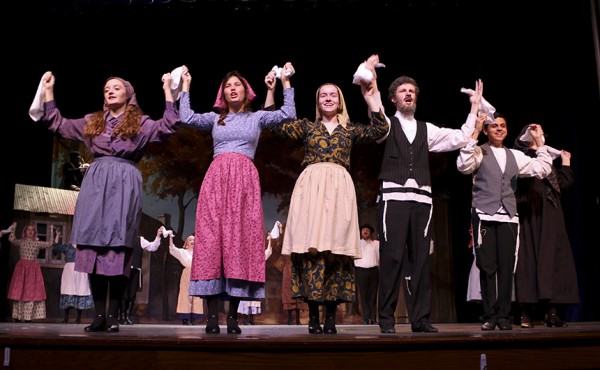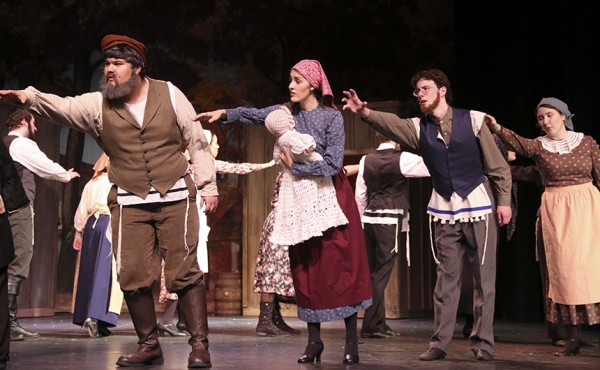Encore! Philelectic Society’s Fiddler on the Roof is Rich with Heart and Spirit
By Theodore P. Mahne
As the Jesuit Philelectic Society opens its production of the musical, Fiddler on the Roof, senior John Howell’s performance makes one truth abundantly clear, even as he sings his wistful lament, “If I Were a Rich Man.”

Villagers of Anatevka perform the hallmark song “Tradition.”
With a lame horse forcing him to pull his own milk wagon, and facing the daily struggle to provide for his family’s modest existence, Tevye the dairyman is a rich man, indeed. Rich in heart and spirit and faith.
Those qualities infuse the Phil’s spring musical, showing why it remains a beloved classic, more than 50 years after its Broadway premiere.
With a large cast that fills the stage in the Jesuit Auditorium to bursting, the simple stories of the villagers of Anatevka in Tsarist Russia transcend time and place and still resonate today. Unfortunately, the fact that repression and war continue to drive the persecuted from their homelands in various parts of the world also adds to making the themes of the 1964 musical timeless.
Director Kate Arthurs-Goldberg brings a tight focus to the production, encapsulating with Tevye’s world that microcosmic view of the struggles for freedom and happiness amid a repressive regime, as well as the rapidly changing times that challenge long-honored traditions and tenets of faith. From the grand opening number, “Tradition,” those key themes of the show are established.
That’s not to say that the show provides only, in the words of Ira Gershwin, “more clouds of grey than any Russian play could guarantee.” It’s not Chekhov, after all. As one would expect, this “Fiddler” is filled with joy, which is brought out by cast members who never fail to have a twinkle in their eye. Each performer also draws out the distinct character-driven humor found throughout the book by Joseph Stein.
As Tevye, Howell brings a remarkable maturity and depth of understanding to a role that can take even the most seasoned actors years to prepare to tackle. Often played broadly over the top, Howell gives Tevye a commanding presence, but also finds moments of nuanced grace that are subtle and gentle. In doing so, Howell also finds the inherent decency and goodness in this man, as well as the range of emotions that run from anger and frustration, confusion and pettiness, and ultimately, to a determined resolve to simply just keep going by faithfully putting his fate into the hands of God.
Jennifer Hawkins plays Golde, Tevye’s put-upon wife, with a no-nonsense appeal. She captures the essence of her love for her family through her perpetual hard work. She and Howell share a pleasantly sparring relationship, beneath which they reveal a true chemistry. As they sing the touching “Do You Love Me?” in the second act, have handkerchiefs at the ready. It is the sweetest and most heartfelt moment of the show.

Tevye’ (John Howell), Tzeitel (Lauren Haefele), Motel (Will Hite), and Golde (Jennifer Hawkins) lament the loss of their home, Anatevka.
The performers playing the oldest daughters and their love interests all create realistic characters who charm. Lauren Haefele and Will Hite exude the excitement of young love as Tzeitel and Motel the tailor. Garrin Mesa is the committed revolutionary Perchik, who sparks both political and romantic attraction in Kaitlin Lombard’s Hodel. (Lombard’s rendition of “Far From the Home I Love” is among the show’s vocal highlights.) And Katie Zimmerman and Talon Comeaux are effective as the sad Chava, who leaves her family and faith for the love of Fyedka, the Russian Christian.
Other pleasing supporting performances in the large cast include Cameron Mazoue as the gruff Lazar Wolf, Isabelle Ward as the prying and persistent Yente the Matchmaker, Blaise Bonura as the Rabbi, and Andrew Busenlener as Mordcha. Theresa Myers and Nicole Lala were delightful in “Tevye’s Dream” as Grandma Tzeitel and Fruma-Sarah. That boldly staged sequence is a marvel of theatrical expressionism.
Choreographer Kenneth Beck’s dances and large ensemble numbers are energetic and spirited, maintaining a spontaneous folk quality that doesn’t feel overly polished. As complex as some of the patterns can be, his choreography has a genuine sense that the dances come forth from within the communal experience.
Beck, Class of ’79, recreates many of the now-iconic moments first staged by Jerome Robbins, including the wedding scene’s rousing Bottle Dance, flawlessly executed by Bo Bell, Cole DiMaggio, Matthew Busenlener and Michael Daly.
The production looks wonderful with set and lighting designs by Ron Goldberg. The costumes by Arthurs-Goldberg and Dee Allen are colorful and appropriate to the characters. Nicole Lala handled makeup designs, effective aging and bearding the men into their older characters.
The orchestra under the direction of Jason Giaccone offers a vibrant rendition of Sheldon Harnick and Jerry Bock’s tuneful score. The sound in the auditorium has been significantly improved with a new audio system.
Tickets are available now, online.
Show dates and times:
Friday, April 20 at 7:30 p.m.
Saturday, April 21 at 2 p.m. (matinee)
Saturday, April 21 at 7:30 p.m.
****
In addition to his position on the Theology Department faculty, Theodore P. Mahne is the chief theater critic for The Times-Picayune/NOLA.com.